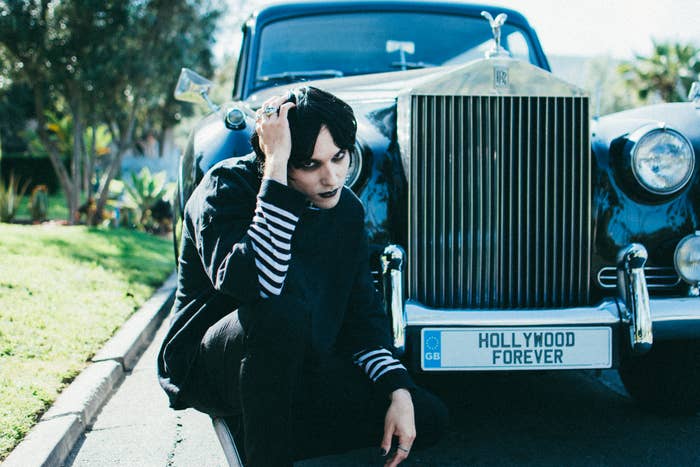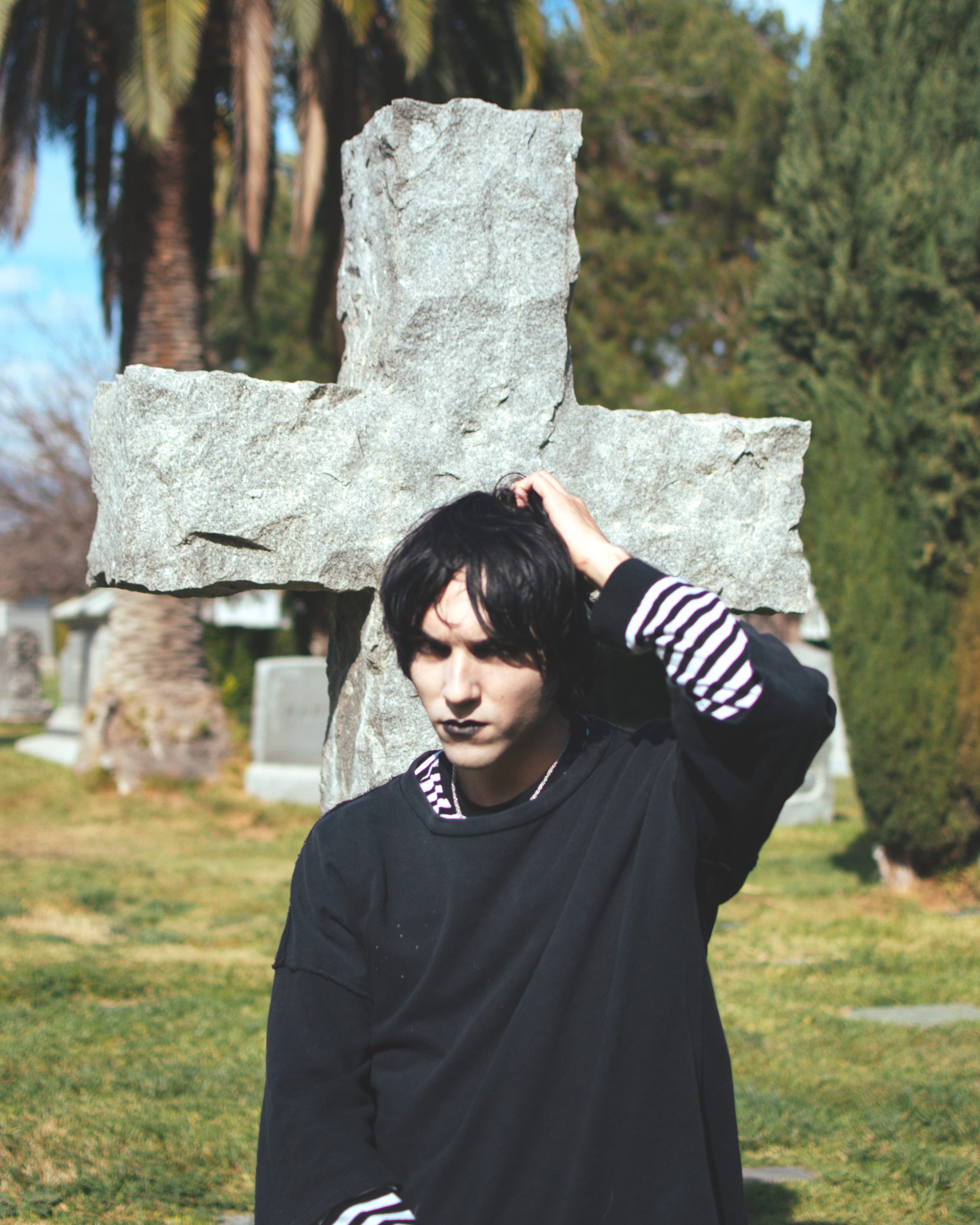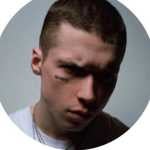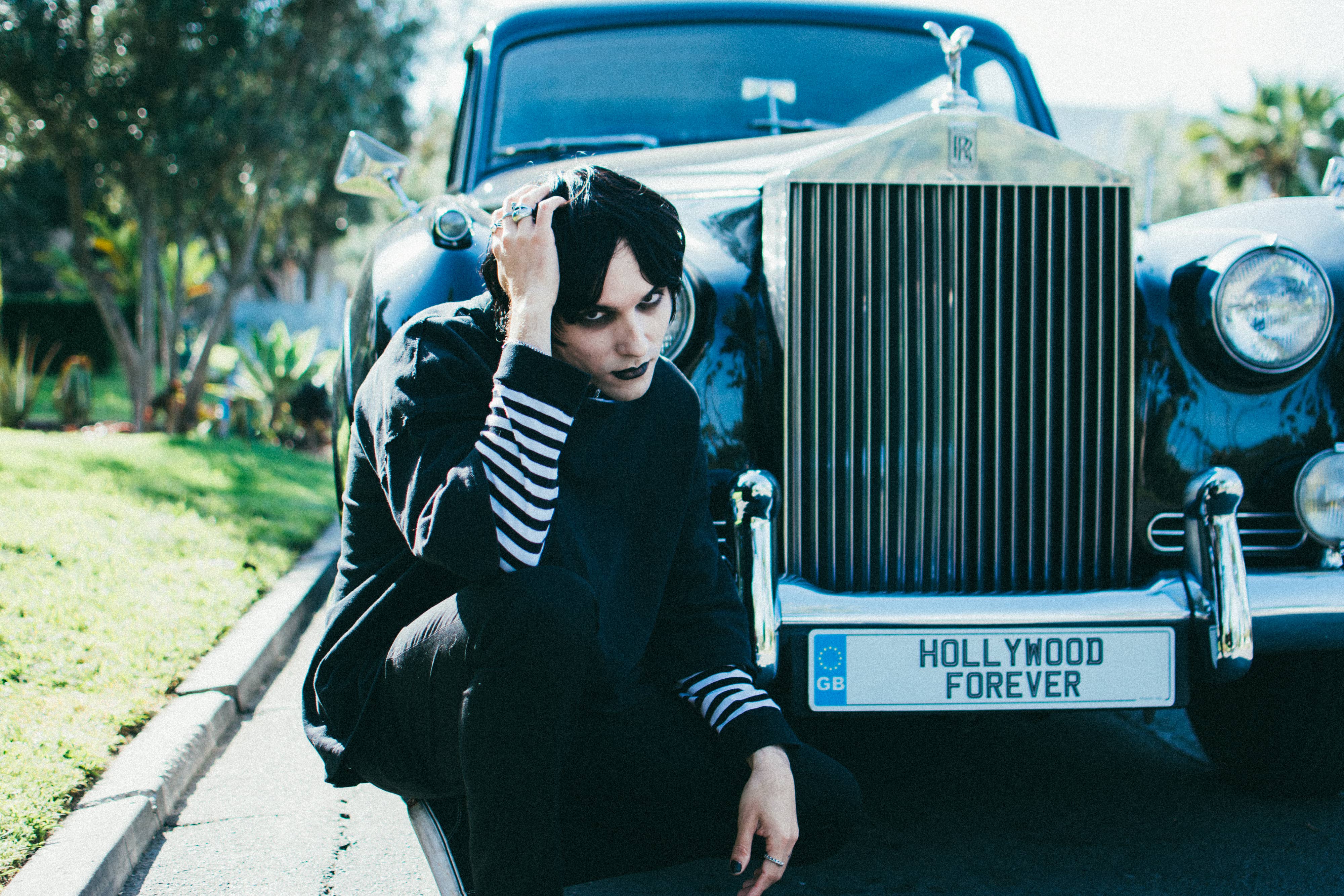
Johnny Goth is surrounded by human corpses. More specifically, he is standing between the mummified body of a midget, the severed arm of a French general, a set of conjoined twins suspended in formaldehyde, and a dead circus clown embalmed in arsenic. He’s about to perform at an iGirl party, a recurring event in L.A. which brings out freaks and creatives alike. Tonight the party is being held at the California Institute of Abnormal Arts, a museum of oddities which also doubles as a live music venue. If some sort of perfect goth universe were to exist, this house of horrors would be it.
With his guitar slung across his shoulder, Johnny leaves the winding labyrinth of dimly lit red lanterns and slowly decomposing cadavers to take the stage. His face is painted ashen white, his lips coated with black lipstick, and his eyes are adorned with a dark eyeshadow à la The Crow’s Eric Draven. His live drummer and bassist each have a similar makeup look to match. The three-piece are eerie, mysterious, and sinister, which makes the poignantly sweet bedroom pop they perform all the more unexpected.
Born and raised in Burbank, California, Johnny was driven to create a musical project in 2015 after discovering DIY artists like Teen Suicide and Alex G on YouTube. “They made me realize that I can [make music] myself," he explains. "I never really thought that I could sing or anything, so I never thought that I could be my own artist.” Cross pollinating these inspirations with influences like the Cure, Marilyn Manson, and Radiohead, Johnny was able to craft a lo-fi dream-pop-meets-goth-rock fusion. Hushed vocals, dreamy guitars, and swirling synths have all become a staple within the indie-rocker’s creations. Yet there’s always been a darker, grittier undertone to Johnny’s singular style.
A month after Johnny’s performance, we sit down for an interview where goths congregate in swarms—Hollywood Forever Cemetery. Despite his all black outfit, Johnny is nearly unrecognizable without his signature makeup look. He admits that this social camouflage is intentional, “I'm a very anxious person most of the time, so putting myself out there freaks me out. So, I feel like the makeup kind of gives me something to hide behind."
As we stand by the burial ground’s gates, wisps of fast moving clouds dot the pale blue sky, and the sun beams brightly off a parked hearse. We seek refuge in the shade of a nearby palm tree, and birds chirp cheerily while park visitors wander around the massive park. Headstones poke from beneath the lush grass, serving as a bleak reminder of death in the otherwise idyllic setting.
This juxtaposition of harmony and gloom is one which Johnny captures well within his music, perhaps most effectively on his 2019 album Let Them In. More recently, Johnny has been releasing singles like “The Better Place” and “Way Down Low,” continuing to toy with the concept of cults, death, and religion. As he works on an upcoming album, he’s been opting for a heavier, churchier sound, straying further away from bedroom pop than ever before. “Before, I was just making whatever and putting it out,” Johnny admits. “Now, I'm actually telling a story with the music and actually evolving the story and the character.”
Read the interview below.
What drew you towards making music?
I just listened to a lot of music growing up. It started with the Beatles, AC/DC, and Metallica. They kind of got me into it. Then when YouTube came around I started listening to newer bands like Teen Suicide and Alex G, super DIY kind of artists. They made me realize that I can [make music] myself. I never really thought that I could sing or anything, so I never thought that I could be my own artist. Instead I started a band with my friends in high school called Pile of Napkins and it was like an alternative rock kind of thing. I would produce all the music for [the band] and then my friends would lay vocals down. Eventually, I started focusing on my own thing and training my voice sort of, trying to sing. After a while I found something that fit musically, so I just started going in and spending all my time working on music.
How'd you teach yourself multiple instruments?
I taught myself how to play piano and guitar, and bass kind of comes hand in hand with guitar. With the internet and everything I was able to just look up tutorials on songs I wanted to learn and eventually just started learning how to play things by ear and from there, just experimented with writing my own songs.
How would you describe the sound of Johnny Goth?
I feel like I'm trying to not fit a certain genre when I make music now. So, it's hard to describe it when it comes to actually putting a name to it. When people ask what my sound is, one of the keywords I try to push is “overcast.” It just seems like it fits my kind of style, a little bit, almost like a genre name.
But other than that I feel like it's a mixture of Elliot Smith sort of with the hushed kind of vocals, a little bit of The Cure with poppiness sort of, and the look too. And maybe Marilyn Manson a little bit. I don't know how else I'd describe it.
Who are some of your influences besides the names you’ve just listed?
Well, yeah them for sure. I'm influenced a lot right now just by super bassy 808 music and trap kind of stuff. So, I'm trying to work that in with the acoustics or indie sounds that I have. And who knows? I like artists like Ghostmane, stuff like that now. Just seeing him, especially his change in style. I feel like it's cool. And, yeah, a lot of Radiohead.
Where did the name Johnny Goth originate from?
It was a quick decision. I had recorded my first release before I came up with a name and something about the name Johnny Goth seemed to roll off the tongue well. I knew that I always went in a darker direction with my art so it felt fitting. It was either that or Johnny Darko and there was already some UK rapper by that name so I decided to go with Johnny Goth [laughs]. Some may say it's a bit on the nose, but I felt it was a good sounding name regardless.
You have a very strong visual component to your act. Where did your face paint look originate from?
That kind of came from just trying to be more mysterious. I'm a very anxious person most of the time, so putting myself out there when it comes to playing live freaks me out. So, I feel like the makeup kind of gives me something to hide behind, so I’m not exactly like myself. It's like a costume sort of, but it's slowly just become part of me because it is an extension of myself, this character sort of.
Is Johnny Goth a character?
I'd say it's a character, but it is very closely related to myself and my thoughts, ideas, all of that. It's just the look and all that is completely different. I usually don't wear the face paint every day—just special occasions. I feel like the face paint makes it harder for people to see me out in the open, you know what I mean?
Definitely. I wouldn't have recognized you today if you didn't have the face paint on.
See? It works. It's a camouflage kind of. But yeah, I like to separate the art from myself so I can just go out. I'm not saying that people would recognize me, but if they did for some reason, I try to avoid that.
Speaking of makeup, you playing the Joker in Harley Quinn: Birds of Prey took a lot of people by surprise. How did that come about?
What happened was my bassist, Tino, was working on the film as a production assistant, and he had heard from the makeup department that they were looking for a body double for the Joker. Basically they were like, "It needs to be someone who fits, who has the same looking hands and the same kind of build," so they asked for my sizes, and had me send a picture of my hands over like that and they compared it to the Jared Leto Joker. We had nearly the same sizes, so they just called me in and I tried on the wig, and got all prepped and made sure everything fit, and then they called me back about a couple months later and we just filmed it. It was just one day. I had to get really intimate with Margot Robbie and the actors, because I had to put my hand on this villain guy's face and pretend to tattoo him. I actually helped design that tattoo, and I designed one of the tattoos on Harley's right shoulder. It's a "J" with a mermaid top, basically like a pinup mermaid with a "J" tail.
It’s pretty amazing that you're within the ranks of all the legendary actors who’ve played the Joker.
I know, the funny thing is that there's just no other representation of the Joker in the film. So technically, I was the Joker in the movie. They had all the streets cleared off for filming. I had to wear this cloak when I went in the streets so the paparazzi didn't take pictures, because if they saw me out there they'd think I was Jared Leto. The funniest part is I went and saw the movie to make sure that they even used the scene in the first place. And then once I knew they did, I just posted about it with no real context to how I got the part, no lead-in to it or anything, and people were just like, "What?" People are messaging me just like, "Hey, I like your music, man, but why are you lying to everyone?" I'm just like, "I'm not, I really was the Joker, I swear." [Laughs]
Your music videos are really cinematic. How do you go about filming them?
I'm lucky to have a lot of friends in the film industry and people who just make films. I grew up making films in high school—me and my bassist Tino would actually make films all the time and the art school would send them to festivals. We'd go around the festival circuit, so we had a lot of exposure to different student art in terms of film. But yeah, I always wanted to make sure that the visuals were on point and they kind of felt like a movie or they kind of told the story. For every video we try to tie it in to this somewhat vague story. Eventually, maybe we'll make a movie or something like that.
What does it take for you to sit down and write a song?
As far as rituals go, I find that when I feel really sad or emotional, I just feel like I have to work on something because it's cathartic and that's usually when the best things come because I'm not focusing too much on the lyrics that I'm writing or the way it sounds. I'm just free flowing. If I'm feeling cheery one day, I can't really get to that point where I could talk about things that are somewhat serious or sad.
One lyric that's always stuck out to me of yours is, "What's it like to be dead?" What are your thoughts on the afterlife? Where do we go?
I think about that a lot.
It seems to be a recurring theme in your work.
I definitely think the themes of death, dying, and running out of time is a big factor in most of my music. I feel like when you die, it's just—you know when you fall asleep but you don't dream? I feel like that's just how it is. You're just going to fall asleep and then that's it. And you won't even know that you're dead. I mean, unless you get stabbed or shot or something like that, then you'll know that you're dying. But I do feel like that's a very peaceful way to go, though, if you do happen to die in your sleep. I wonder if your life just flashes before your eyes or something? What happens? Are you forced to reevaluate everything that you've done? I don't know if I believe in an afterlife. I mean, I would like to think that it exists. It's comforting.
What are your thoughts on the goth subculture becoming a trend in recent years?
I have definitely noticed it becoming more popular over the recent years. Back when I started writing under the name Johnny Goth I was unaware of any other artists going for any kind of goth style or name at the time. It's interesting though, that it’s made a comeback and evolved in this way. It seems like “goth” has become more broad and even has subgenres of it’s own now so more people are attracted to different aspects of it.
There are also a lot of debate now over what music is actually goth as if it’s all supposed to sound like Bauhaus or something. [Laughs] I’d take a look at The Cure, they have a variety of different sounding songs, ranging from pop to goth but their style is consistent so a lot of it has to do with style and fashion. I think a lot of people resonate with the subculture now more than ever since it seems like the world is falling apart and this music and style allows people to express their dark thoughts and emotions in a more constructive way. Ultimately I think that everyone has a little goth inside them.
None
Tell me more about this upcoming project of yours.
I'm toying with a couple names right now. I only have two. I haven't really given it much thought, but I was thinking of calling it The Better Place, after the latest single that I dropped. I tried to get really hypnotic with that, and I feel like this next release, The Better Place, plays with themes of cults and religion and stuff like that. Like, "Come with me. I'll take you to the better place, if you follow me."
I feel this next album really focuses on those themes of just following people, someone who seems like a leader, being led by fear into believing things that aren't real. And religion is definitely a big theme in this next album. That's why I tried to make it sound really churchy. But yeah, it's either The Better Place or I'm thinking Hallelujah, because I have one track coming out called “Hallelujah.” It's very bass heavy. It's probably my most trappy kind of track yet, which is weird, because I'm not like a rapper or anything that, so whenever I tell somebody about it, you're like, "Huh?"
Religion seems to play a big part in your work as well.
I don't have a manager or a team, just my band when I play live. So I handle all of the promotion myself. I've just started getting into Google ads and Instagram ads and all that, so sometimes I'll specifically target religions. And I'll get comments just like, "What the fuck is this?" People will be commenting Bible verses. Or people will message me and be like, "Hey, I really wanted to get a shirt but my parents won't let me get it because they say you're anti-Christian." I mean, it could be a good thing. I've gotten a decent amount of people and they're asking like, "Are you okay?" They'll be like, "I love your music, but lately you've been scaring me."
I don't mind pissing people off if they don't fully understand what I'm doing. I feel it's kind of entertaining. I get a kick out of it. But yeah, I've been going in that direction. It's weird, because I'm mainly known for bedroom pop right now, but I've been making such big changes to my sound and my style, so I don't want to lose all the fans, you know what I mean? But at the same time I just want to keep doing what I want to do. I've had times where I wasn't sure if I wanted to start a completely different project, they call it something else and put this new stuff out under that. But at the same time it's kind of cool to have this progression from soft, almost cutesy bedroom artist into this anti-religious, occult artist.
You released five projects in the span of two years. How has your sound evolved throughout each release?
I think for sure with this next release, the sound has shifted completely. It's a lot heavier—I'd say it's got an air of occult to it and that kind of churchy sort of choir-y sounds. Before, I was just making whatever and putting it out, but now I'm thinking more so about actually telling the story with the music and evolving the story and the character. I'm really into the dark metal-sounding, grunge-y stuff, but a lot of my most popular songs have a really soft, kind of indie bedroom pop type sound, so I'm trying to move away from that. I'm almost fulfilling the character, the name, you know what I mean? Because before it was so contrasted with Johnny Goth, the goth look with this soft indie pop sound. I'm just starting to fill the shoes of the character.


